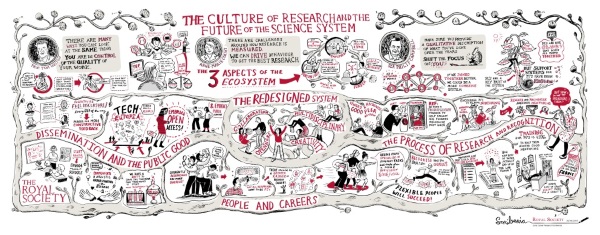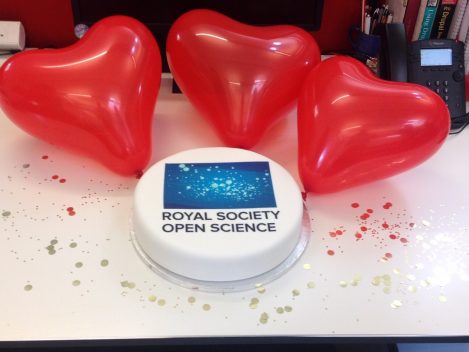One year ago, the Royal Society hosted the Research culture: Changing expectations conference.


One year ago, the Royal Society hosted the Research culture: Changing expectations conference. Across two days, over 30 speakers took part in discussions, presentations and speeches in front of an audience of over 200 people. Even more people tuned into the live feed, videos from which are still available on the research culture website, and many carried on the conversation on Twitter and other platforms. The full report is available to download (PDF).
The conference ended with a call to action for attendees to consider how they could improve research culture in their own institutions. In this blog we report back on a snapshot of the work of some of these individuals and organisations.
What’s happened since last October
A lot! Numerous conferences, workshops and events have been organised all over the world including a meeting at John Hopkins University in the US on professional norms in mathematics, several workshops organised by the Swiss Academy of Sciences as part of their We scientists shape science programme and a conference on Developing research culture at Shifa Tameer-e-Millat University in Pakistan. Closer to home, events include the Digital Innovations in Mental Health conference in London, the Re-imagining research culture forum at the University of Glasgow, a session on wellbeing and mental heath at the British Pharmacological Society’s annual conference and the UK Council for Graduate Education’s 2019 Annual Conference, Enhancing Postgraduate Research Cultures.
Wellcome Trust, University of Glasgow and eLife have initiated new programmes of work on research culture and practices. Wellcome will be hosting events in 2020 to share the findings from their survey, bringing the community together to find solutions for reimagining research. Research culture is one of the central pillars of the newly established Research on Research Institute (RoRI), a joint initiative between Wellcome Trust, Digital Science and the Universities of Sheffield and Leiden. They will be working with a consortium of partners to share data and undertake experiments and strategic analysis of various kinds.
Metis Talk, a blogging platform set up by the Society policy staff alumni who organised the conference, has been created to allow ideas and innovations around the system of research to be discussed, debated and tested.
Research culture includes a range of topics. Activity on specific topics is highlighted below.
Collaboration and multidisciplinarity
One of the winners of The Pitch: ideas to positively change research culture competition at the conference, the Bring in the Bigger Brains scheme, has successfully piloted their idea at University of Reading. The scheme aims to provide early careers researchers (ECRs) with the opportunity to explore and develop a scientific idea for themselves whilst gaining guidance and support from knowledgeable academic and technical staff, the ‘Bigger Brains’.
The biomedical and life sciences journal eLife have established eLife Ambassadors – a global network of active researchers, predominantly at early stages in their careers, who work together to help promote greater openness, collaboration, improved reproducibility, diversity and funding access in life sciences and biomedicine.
Equality, diversity and inclusion
Considerable efforts in this area have been made since the conference, shifting from conversations around gender equality to improving working conditions for all people who are under-represented. Dr Jess Wade and others have written in more detail on the topic in their blog post Equality, diversity and inclusion in 2019: the good, the bad and the bigoted.
Bullying and harassment
Many are reviewing approaches to address bullying and harassment. For example, Cancer Research UK are helping to tackle bullying and harassment in research and promoting positive culture change by publishing their new Dignity at Work in Research Policy. UK Research and Innovation have recently published their position statement alongside an evidence review on bullying and harassment which has identified a number of key challenges and presents recommendations to improve current practice.
Career pathways
Cardiff University has established its Researcher Pathways Working Group, which will hold pop up workshops and convene focus groups to ensure that the researcher voice is an integral part of strategic decision-making within the University’s research environment.
The University of Glasgow is further embedding their innovative formal career pathways for technologists and research scientists and holding visits and discussions with other Russell Group universities to share best practices.
The revised Concordat to Support the Career Development of Researchers has been launched. The Concordat is an agreement between stakeholders to improve the employment and support for researchers and researcher careers in higher education in the UK.
Rewards and recognition
Discussion about rewards and recognition featured highly at the conference and since then, many, including ourselves at the Society, have been thinking about how we can make changes. Résumé for Researchers is tool which aims to capture outputs and success measures found on a standard CV as well as activities such as public engagement and knowledge exchange. The principles of Résumé for Researchers have been introduced in our grants processes. Find out more in Professor Richard Catlow’s blog.
Cancer Research UK have updated their grant application forms to recognise and encourage all outputs of research in addition to publications. The Royal Society of Chemistry have concluded a review of their prizes and awards and will be publishing more details before the end of the year, whilst others like the University of Glasgow, have introduced new awards which celebrate those who are making positive changes to research culture.
Integrity and reproducibility
Research integrity covers everything from abiding by institutional policies, standards and protocols, to reporting research findings clearly and transparently, and is an essential part of good research. Following a House of Commons Science and Technology Committee inquiry, Universities UK held a consultation to revise the Concordat to Support Research Integrity. The revised Concordat is expected soon.
Vitae in partnership with the UK Research Integrity Office (UKRIO) is conducting a study exploring what motivates researchers to maintain high standards of research integrity.
The UK Reproducibility Network (UKRN) is a multidisciplinary peer-led network that aims to coordinate efforts to ensure that the practice and methods of scientific research are rigorous and the outputs robust and reproducible. UCL has engaged closely with UKRN to promote transparency and reproducibility in its institution through activities such as their ‘ReproducibiliTea’ Journal Club and holding a town hall on reproducibility.
Open Access and publishing
Last week saw the tenth Open Access Week which gave the research community the opportunity to learn more about the potential benefits of Open Access and to help inspire wider participation in helping to make Open Access a new norm in scholarship and research. One of our open access journals, Royal Society Open Science, has just celebrated its fifth birthday. Read more about how it champions open and transparent science through open access, open peer review and open data in this blog.
Another winner of ‘The Pitch’ competition, Dr Alex Freeman, proposed a new approach to sharing primary scientific research – her platform ‘Octopus’. On Octopus, researchers can easily publish their hypotheses, methods, results and analyses to be reviewed by other users. Find out more in Alex’s blog.
Other initiatives in this area include UCL’s Research Data Repository which enables researchers to preserve research data of value long-term and make it available to others as Open Data, and the Global Young Academy, a body that represent young scientists across the world, who have recently published a report to encourage further debate and investigation on Publishing models, assessment and open science.
Thank you!
Thank you to those that have contacted me and sent me examples of the work that you are doing. Creating a change in research culture is not an individual effort. We need to continue to work together. We hope you keep on feeling inspired by the work that others are doing.
As we mark one year on from the conference, we’d like you to reflect and share some of your activities and initiatives. Tweet using the hashtag #ResearchCulture. Also check out our other blogs on equality, diversity and inclusion, Octopus: a radical new approach to scientific publishing, and our new tool Résumé for Researchers, alongside existing research culture programme material on our website.





